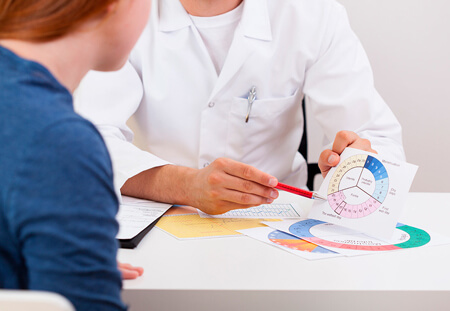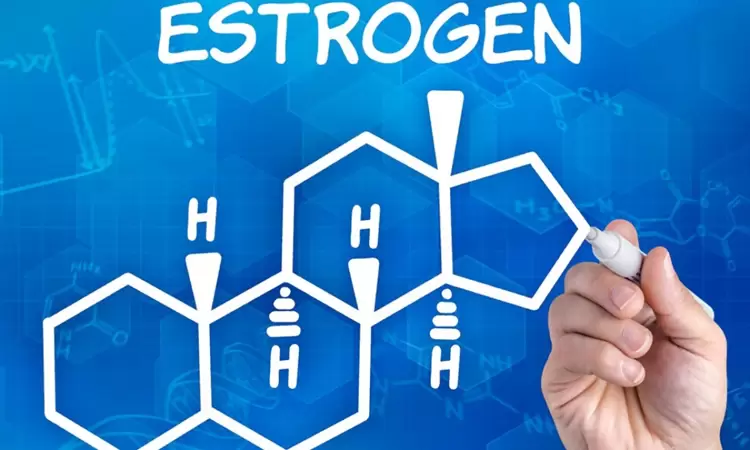- Video: Women's Health Questions : How to Boost Estrogen
- What is estrogen?
- Video: Mayo Clinic Minute: Women, estrogen and heart disease
- What is the function of estrogen?
- Video: Estrogen & progesterone
- How the body synthesizes estrogen
- Video: The Underlying Causes And Solutions For Women’s Hormonal Imbalances
- Signs of hormonal imbalance in a woman
- How do I check my estrogen levels?
- What should be the optimal level of estrogen in women to be healthy?
- How to normalize the level of estrogen in the body?
- Video: Hormones and the Gut –How they are Connected.
- Rate the author (2)
- Comments (1)
Estrogens are a group of hormones that are produced in the ovaries, adrenal glands, and other tissues. These hormones play a key role in the female reproductive process and control many functions in a woman's body, including the menstrual cycle, breast development, bone density, cholesterol levels, skin and hair condition, and emotional status.
The following are a few specific examples of how a woman's health depends on estrogen:
- Control of the menstrual cycle: Estrogens are involved in the regulation of the menstrual cycle, helping to create optimal conditions for the initiation, development and rejection of the uterus line. They can also affect the frequency and duration of the cycle.
- Breast development: Estrogens play an important role in breast development. They help increase the size and number of glandular tissues that are needed for milk production during breastfeeding.
- Bone Density: Estrogens are important for maintaining healthy bone density. They help stop bone breakdown by supporting normal bone turnover.
- Cholesterol levels: Estrogens can help lower the amount of cholesterol in the blood, reducing the risk of cardiovascular disease.
- Skin and hair condition: Estrogens can improve skin elasticity and hydration, and increase hair shine and bounce.
- Emotional well-being: Estrogens can also boost mood and reduce anxiety and depression.
Lack of estrogen can lead to a number of health problems in women, including menstrual irregularities, infertility, osteoporosis, increased risk of cardiovascular disease and other diseases.
Also, excessive release of estrogens can lead to the development of cancer of the breast, ovaries and other organs of the reproductive system. Therefore, it is important to monitor your estrogen levels and get regular medical check-ups to assess the risks and prevent them if possible.
So, what are estrogens and why are they needed - further in our article.
Video: Women's Health Questions : How to Boost Estrogen

What is estrogen?
Estrogens are a group of female sex hormones that are produced in the ovaries and in smaller amounts in other tissues such as the brain, bone and adipose tissue. They play an important role in the development and functioning of the female reproductive system, as well as in the regulation of many other bodily functions such as metabolism, bone density, skin and hair, mood and cognitive function.
Estrogens affect the growth and development of female reproductive organs such as the uterus, ovaries, and breasts, as well as the menstrual cycle and pregnancy. They are also involved in the regulation of blood cholesterol levels and bone metabolism, making them important for lifelong health.

Estrogen levels can change throughout a woman's life, including periods of pregnancy, menstruation, and menopause. Low estrogen levels can lead to a variety of health problems, including osteoporosis, cardiovascular disease, depression, and reduced quality of life.
You may be interested in information about what herbal preparations help in the fight against symptoms of menopause - read our other article.
Video: Mayo Clinic Minute: Women, estrogen and heart disease

What is the function of estrogen?
Estrogens play an important role in the functioning of the female reproductive system, as well as in the regulation of many other processes in a woman's body. Some of the functions that estrogens perform include:
- Development and function of the female reproductive organs. Estrogens play an important role in the growth and development of the ovaries, uterus, and vagina, as well as in the regulation of the menstrual cycle.
- Development and maintenance of the breast. Estrogens promote the growth and development of the mammary glands, which allows women to breastfeed their children.
- Regulation of metabolism. Estrogens affect the metabolism of fats, carbohydrates, and proteins in a woman's body, which can affect her weight and overall health.
- Regulate bone density. Estrogens play an important role in the formation and maintenance of bone density, which may help prevent osteoporosis and other bone diseases.
- Regulate blood cholesterol levels. Estrogens can help reduce "bad" cholesterol levels. cholesterol (LDL) in the blood and increase the level of "good" cholesterol (HDL), which can reduce the risk of developing cardiovascular disease.
- Mood regulation. Estrogens can affect a woman's mood and emotional state, which can be especially noticeable during menstruation or menopause.
- Development and maintenance of skin and hair. Estrogens can affect the quality of skin and hair, making them healthier and more beautiful.
These are just some of the functions that estrogens perform, and their role in a woman's body can be very important throughout her life.
You may be interested in information about how long menopause lasts for women - read our other article.
Video: Estrogen & progesterone

How the body synthesizes estrogen
The process of estrogen synthesis begins with cholesterol, which is converted to progesterone in the ovaries. Progesterone can then be converted to estrogen through the process of aromatization, which occurs in tissues that contain the aromatase enzyme.
Estrogens can also be synthesized from androstenedione and testosterone, which are produced in the ovaries and adrenal glands. The process of synthesizing estrogens from these precursors also includes aromatization, which occurs in tissues containing aromatase.
It is important to note that estrogen levels may be limited in case of health problems with the ovaries or other organs that are involved in the production of estrogen. Also, in some cases, certain medications can lead to a decrease in estrogen levels. If you have questions about your health, it is recommended to consult a doctor.
Video: The Underlying Causes And Solutions For Women’s Hormonal Imbalances

Signs of hormonal imbalance in a woman
Hormon imbalance in a woman can manifest itself in various ways, depending on the specific hormone that is in short supply or excess.
For example, low estrogen levels can lead to the following symptoms:
- Irregular or absent periods
- Vaginal dryness and itching
- Headaches
- Skin Saturation
- Muscle loss
- Increased risk of osteoporosis
On the other hand, excess estrogen can lead to the following symptoms:
- Irregular or painful periods
- Fat pads in thighs and buttocks
- Headaches
- Increased risk of breast cancer
- Lower libido
- Nervousness and irritability
Low progesterone levels can lead to the following symptoms:
- Irregular or absent periods
- Painful periods
- Weight gain
- Anxiety and anxiety
- Fatigue
- Insomnia
Excess testosterone can lead to the following symptoms:
- Facial and body hair enhancement
- Acne
- Irregular or absent periods
- Deep voice
- Increased muscle mass
- Lower libido
It is important to note that the signs of hormonal imbalance in a woman can be very diverse and depend on many factors, including age, general health, heredity, lifestyle, and others. If you suspect a hormone imbalance, it is recommended that you see a doctor for diagnosis and treatment.
How do I check my estrogen levels?
Estrogen levels in women can be checked with a special blood test called an "estrogen test". This test allows you to determine the concentration of various types of estrogen in the blood, including estradiol, estriol and estridiol.
Typically, this test is given to women who have signs of estrogen deficiency or excess, such as irregular menstruation, infertility, endometrial hyperplasia, ovarian tumors, and other conditions. It is important to consult a doctor so that he can prescribe an analysis and correctly interpret its results.
What should be the optimal level of estrogen in women to be healthy?
Optimal estrogen levels in women depend on their age and stage of life. During the reproductive years, estrogen levels should be sufficient to maintain the health of the reproductive system and the natural cycle of menstruation. During menopause, estrogen levels usually decrease, but it is important that they remain within the safe zone to avoid the risk of osteoporosis, cardiovascular disease, and other diseases associated with estrogen deficiency.
Specific figures for optimal estrogen levels may vary depending on the laboratory that performs the analysis and the method used to measure. It is also important to take into account the individual characteristics of the body and the presence of other diseases. Therefore, determining the optimal level of estrogen should be carried out by a doctor who can analyze the results of the tests, taking into account age, medical history, symptoms and other factors.
How to normalize the level of estrogen in the body?
The normalization of estrogen levels in the body in women depends on the cause of the lack or excess of estrogens. In some cases, lifestyle changes can help normalize estrogen levels. For example, proper nutrition, healthy sleep, moderate exercise, and stress reduction can help stabilize estrogen levels in the body.
However, in some cases, medication may be required. For example, with a lack of estrogen during menopause, hormone therapy may be prescribed to compensate for the estrogen deficiency. With an excess of estrogen, medications may be prescribed to help reduce the level of estrogen in the body.
In any case, the choice of treatment and normalization of estrogen levels should be carried out by a doctor who will conduct the necessary studies and determine the cause of the violation of estrogen levels, on the basis of which the most effective method of treatment and normalization of estrogen levels will be selected.
Video: Hormones and the Gut –How they are Connected.



















Comments (1)